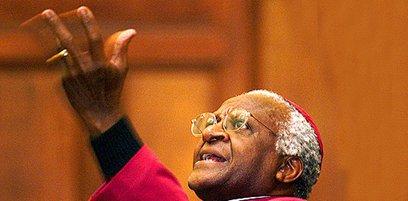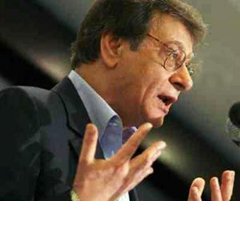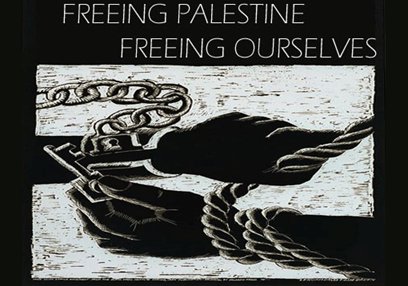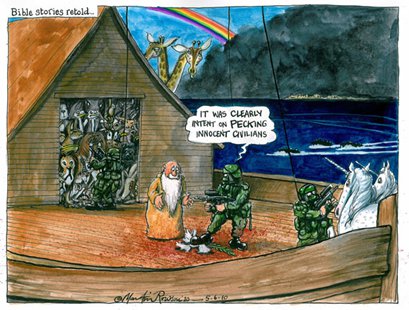Cultural Boycott
“Just as we said during apartheid that it was inappropriate for international artists to perform in South Africa in a society founded on discriminatory laws and racial exclusivity, so it would be wrong for Cape Town Opera to perform in Israel.” – Archbishop Desmond Tutu
Since April 2004, the Palestinian Campaign for the Academic and Cultural Boycott of Israel (PACBI), a key part of the BDS National Committee (BNC), has called upon intellectuals and academics worldwide to “comprehensively and consistently boycott all Israeli academic and cultural institutions as a contribution to the struggle to end Israel’s occupation, colonization and system of apartheid.”
In 2006, a decisive majority of Palestinian cultural workers, including most filmmakers and artists, supported by hundreds of international cultural workers, appealed to all international artists and filmmakers of good conscience to join the institutional cultural boycott against Israel. In response, the renowned British artist and writer, John Berger, issued a statement that was backed by dozens of prominent international artists, writers and filmmakers calling on their colleagues everywhere to endorse the Palestinian cultural boycott call.
In the spirit of this cultural boycott and consistent with its logic, on 8 May 2008, in a half-page advertisement in the International Herald Tribune under the banner “No Reason to Celebrate,” tens of leading international cultural figures — including Mahmoud Darwish, Augusto Boal, Ken Loach, Andre Brink, Ella Shohat, Judith Butler, Vincenzo Consolo, Ilan Pappe, David Toscana and Aharon Shabtai — signed a statement responding to worldwide celebrations of Israel’s “60th anniversary” saying:
There is no reason to celebrate! Israel at 60 is a state that is still denying Palestinian refugees their UN-sanctioned rights, simply because they are ‘non-Jews.’ It is still illegally occupying Palestinian and other Arab lands, in violation of numerous UN resolutions. It is still persistently and grossly breaching international law and infringing fundamental human rights with impunity afforded to it through munificent US and European economic, diplomatic and political support. It is still treating its own Palestinian citizens with institutionalized discrimination.
The cultural boycott campaign against apartheid South Africa has been a major source of inspiration in formulating the Palestinian boycott calls and their criteria. In that context, the key argument put forth by the South African apartheid regime and its apologists around the world against the anti-apartheid cultural and sports boycott–that boycotts violate the freedom of expression and cultural exchange–was resolutely refuted by the director of the United Nations Centre Against Apartheid, Enuga S. Reddy, who in 1984 wrote:
It is rather strange, to say the least, that the South African regime which denies all freedoms … to the African majority … should become a defender of the freedom of artists and sportsmen of the world. We have a list of people who have performed in South Africa because of ignorance of the situation or the lure of money or unconcern over racism. They need to be persuaded to stop entertaining apartheid, to stop profiting from apartheid money and to stop serving the propaganda purposes of the apartheid regime.
Similarly, the Palestinian boycott call targets cultural institutions, projects and events that continue to serve the purposes of the Israeli colonial and apartheid regime.
In reaction to Israel’s Freedom Flotilla massacre which led to the murder of 9 unarmed Turkish humanitarian relief workers and human rights activists – one with dual Turkish/US citizenship — and to the injury of dozens more from several countries, leading cultural figures and bands reacted swiftly and decisively.
Endorsing a cultural boycott of Israel, world renowned British writer, Iain Banks, wrote in the Guardian that the best way for international artists, writers and academics to “convince Israel of its moral degradation and ethical isolation” is “simply by having nothing more to do with this outlaw state.” This position by Banks was later endorsed by Stephane Héssel, co-author of the Universal Declaration of Human Rights, Holocaust survivor and former French diplomat.
Many British literary and academic figures published a letter in the Independent that said, “We … appeal to British writers and scholars to boycott all literary, cultural and academic visits to Israel sponsored by the Israeli government, including those organised by Israeli cultural foundations and universities.”
Cartoon artist Martin Rowson expressed the shock shared by millions in a cartoon in the Guardian. Rowson depicted intimidating, heavily-armed Israeli commandos commandeering Noah’s ark, incarcerating all the frightened animals, with one of the soldiers cruelly crushing a dead peace dove — olive branch and all — justifying it to a devastated Noah by saying, “[The dove] was clearly intent on pecking innocent civilians.”
In the world of performing arts, the Klaxons and Gorillaz Sound System cancelled their scheduled concerts in Israel, reportedly due to the Flotilla attack, and so did the Pixies.
Another famous performer to cancel a gig in Israel is US folk singer Devendra Banhart. While holding on to the delusional and peculiar concept that a musician can simply “share a human not a political message” even if performing to the oppressor community, as it were, in the context of occupation, apartheid and extreme violations of human rights, Banhart justified his withdrawal by saying that “it seems that we are being used to support views that are not our own.” Israeli media outlets had tried to portray his scheduled gig as a political message in solidarity with Israel at a time of increasing isolation.
World best-selling writer, the Swedish Henning Mankell, who was on the Freedom Flotilla when attacked, called for South-Africa style global sanctions against Israel in response to its brutality.
The best-selling US author, Alice Walker, reminded the world of the Rosa Parks-triggered and Martin Luther King-led boycott of a racist bus company in Montgomery, Alabama during the US civil rights movement, calling for wide endorsement of BDS against Israel as a moral duty in solidarity with Palestinians, “to soothe the pain and attend the sorrows of a people wrongly treated for generations.”
In the weeks before the Flotilla attack, artists of the caliber of Elvis Costello, Gil Scott-Heronand Carlos Santana all cancelled scheduled performances in Israel after receiving appeals from Palestinian and international BDS groups.
But even well before the latest Israeli bloodbath, many prominent international cultural figures had heeded or directly supported cultural boycott appeals issued by the PACBI and widely supported by Palestinian civil society. It may be most convenient to break down the various artists/cultural figures’ responses to the PACBI Call into three categories:
(A) Cultural figures (artists, authors, etc.) who explicitly support the Palestinian cultural boycott of Israel.
Roger Waters spraying “No Thought Control” on Israeli Wall in Bethlehem
The statement by 500 Artists against Apartheid in Montreal is perhaps the most impressive of these efforts. It inspired Irish artists, at the initiative of the Irish Palestine Solidarity Campaign, to issue their own, nation-wide “Irish Artists’ Pledge to Boycott Israel” in August 2010, endorsed by more than 200 artists to date, including some of the most prominent. In November 2010, in a watershed, South African Artists Against [Israeli] Apartheid issued their founding declaration, which stated:
As artists of conscience we can act to resist the normalization of Israel’s apartheid policies. Some may hide behind the excuse that art is apolitical. However, artists have not been hesitant in taking a position against racism and inequality. As South Africans we benefitted from such a position of conscience.
Earlier, in 2006, the famous British author and artist, John Berger, issued a statement explicitly endorsing the cultural boycott of Israel. He collected 93 endorsements then on this powerful declaration, including some very prominent writers and artists.
Naomi Klein in Bil’in
Other intellectuals and artists in this category who were not on the Berger list include: Roger Waters, Ken Loach, Judith Butler, Naomi Klein, The Yes-Men, Sarah Schulman, Aharon Shabtai, Udi Aloni, Adrienne Rich, John Williams (perhaps the greatest classical guitarist alive), and now Iain Banks, Alice Walker, Dave Randall and Maxi Jazz of Faithless, among others.
(B) Cultural figures who openly refuse to participate in Israel’s official celebrations and festivals for unambiguous political reasons.
In 2008, countering Israel’s “60th Anniversary” celebrations, PACBI collected tens of signatures of prominent artists and authors for a half-page advertisement that was published in the International Herald Tribune on 8 May that year. The list included luminaries like Mahmoud Darwish, Augusto Boal, Roger Waters, Andre Brink, Vincenzo Consolo, and Nigel Kennedy. Some of the signatories on that ad later adopted the boycott explicitly, moving to Category (A) above.
(C) Cultural figures who decline offers to perform/speak in Israel or agree and then cancel without giving any explicit political reasons.
This category includes: Bono, U2, Bjork, Jean-Luc Godard, Snoop Dogg, Vanessa Paradis, and others.
PACBI appealed to Bono, for instance, in 2008 and again in 2010, urging him not to perform in Israel. Both times his performances were cancelled, but he never gave a specific reason to the media, other than the regular “scheduling” problem. PACBI deeply appreciates his decision not to entertain Israeli apartheid.
Many top artists refuse to perform in Israel from the start. The Forward, the leading Jewish daily in New York, informs us that at least 15 leading performers actually refused to play Israel, despite lucrative remuneration offers:
In reaction, a music industry insider confirmed that the winds could be shifting. The music executive, who spoke on condition of anonymity in light of his ongoing business ties with artists, said that in recent months he had approached more than 15 performing artists with proposals to give concerts in Israel. None had agreed. The contracts offered high levels of compensation. He called them ‘extreme, big numbers that could match any other gig.’
Violating the Boycott to Voice Criticism?
Some artists argue that, instead of boycotting, they prefer to visit Israel and use the performance opportunity to express their views against Israeli injustices. This ostensibly noble idea is not only — unfortunately — too rare to be viewed as significant; it is ill conceived. Such a hypothetically courageous stance cannot possibly outdo or neutralize the far more substantial harm done due to these performances taking place, as Israel, with its formidable influence in mainstream Western media, cynically uses them to project a false image of normalcy that enables it to maintain its occupation and apartheid. Ultimately, a conscientious artist is expected to heed the appeals of the oppressed as to what they really need from them in the struggle to end injustice and colonial oppression. This was true in the South African anti-apartheid struggle, too.
Art Above Politics?
As to the commonly used “art ought to be above politics” argument, it is patently ahistorical and political par excellence. Artists are humans who are expected to be more, not less, sensitive than others in empathizing with human suffering and rejecting oppression. When they choose to side with hegemonic oppressors for money, fame or other material gains at the expense of basic commitment to human rights, they end up selling their souls and declaring their utter ethical corruption. Artists, like Elton John, who violated the anti-apartheid cultural boycott and entertained South Africans at Sun City, were viewed as crossing a moral picket line. So are those that insist on entertaining Israeli apartheid today.
Source: http://www.bdsmovement.net/activecamps/cultural-boycott






